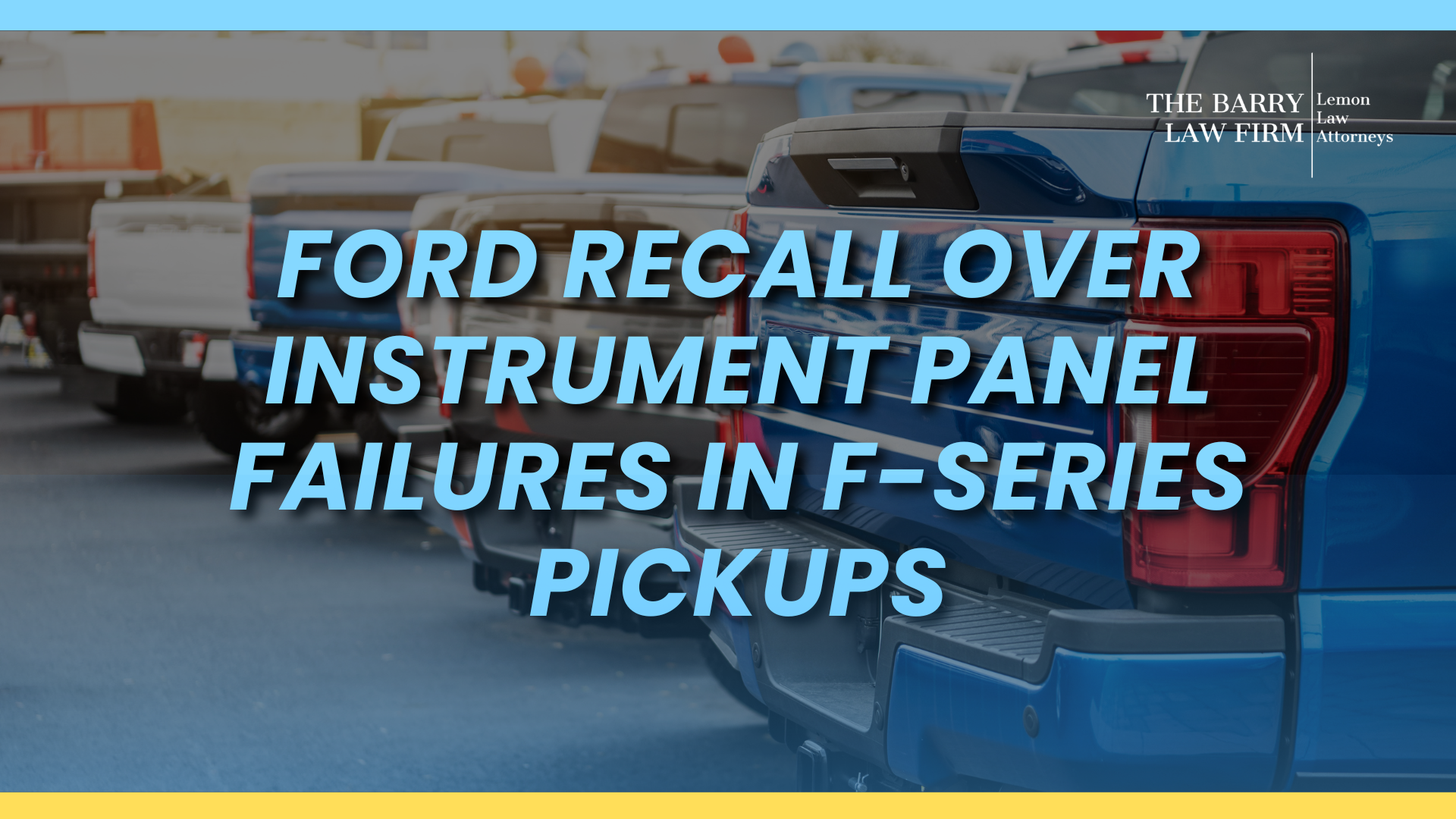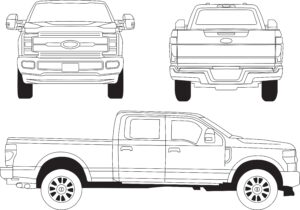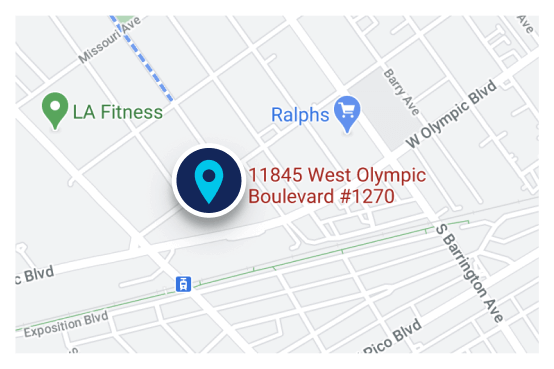
Ford Motor Company has announced a major recall involving hundreds of thousands of its most popular trucks. Select 2025–2026 Ford F-Series pickups are being recalled due to defective instrument panel clusters that may fail at startup. For consumers, the issue raises serious concerns about safety, transparency, and whether Ford has done enough to protect drivers.
According to documents filed with the National Highway Traffic Safety Administration (NHTSA), the defect stems from an instrument panel cluster (IPC) that may not activate properly when the vehicle is started. This leaves drivers without critical information such as vehicle speed, warning lights, and system alerts. Without a functioning display, drivers face a heightened risk of accidents, particularly in high-traffic or high-speed situations.
While Ford has stated it is unaware of any crashes or injuries caused by this defect, the scale of the recall underscores its severity. In total, more than 355,000 vehicles are impacted — including Ford’s flagship trucks that millions of Americans rely on for work and daily transportation.
For truck owners, this recall adds to the growing frustration with modern vehicle technology, where electronic and software glitches are becoming increasingly common. The trucks being recalled are not only workhorses but also expensive investments, and any defect that threatens safety can quickly erode consumer trust. The recall also raises questions about Ford’s quality control processes, especially for a lineup of vehicles that is central to its reputation and sales. Many drivers are now left to wonder whether this is an isolated issue or a symptom of larger challenges in the manufacturing process.
The Defect and Its Hazards
The root problem is the failure of the instrument panel cluster to power up correctly. When the display fails, drivers are left in the dark — unable to monitor speed, fuel levels, or dashboard alerts. Such failures can create dangerous conditions on the road.
Imagine merging onto a freeway without knowing your speed, or driving long distances without visibility into fuel status. The absence of safety indicators such as engine warnings or brake alerts compounds the risks. For drivers of heavy-duty trucks like the F-250, F-350, and F-450, where performance and precision matter, these failures can be especially hazardous.
Ford has acknowledged the defect but insists the issue can be resolved through a simple software update, either at dealerships or through an over-the-air (OTA) fix. The question many consumers will ask is whether this solution is sufficient to fully address the risk — and whether Ford acted quickly enough in notifying affected owners.
In reality, this type of failure highlights the tension between convenience and risk in today’s software-driven vehicles. A glitch may seem minor compared to a mechanical failure, but its consequences can be just as dangerous. Truck owners expect reliability, and being forced to question whether their dashboard will even work undermines confidence in the entire vehicle. Such defects also cast doubt on whether similar problems might appear in other electronic systems down the line.
Which Ford Trucks Are Affected? 
The recall covers a wide range of Ford’s most popular trucks, including both Super Duty and light-duty models. Specifically, the affected vehicles include:
- Select 2025–2026 Ford Super Duty F-250, F-350, F-450, and F-550 trucks built between June 6, 2024, and July 22, 2025.
- Certain 2025 Ford F-150 models produced between May 14, 2024, and July 25, 2025.
In total, 355,656 trucks are affected by the recall. Ford has assigned the reference number 25S88 to this campaign, with owner notifications expected to begin on September 2, 2025.
For many drivers, these trucks are not just personal vehicles but essential tools for work and family life. A recall of this magnitude disrupts not only daily schedules but also livelihoods. Delays in recall repairs or difficulties scheduling service appointments could create additional headaches for truck owners who depend on their vehicles every day. The scale of the recall also raises concerns about whether dealerships will be able to handle the high volume of updates in a timely manner.
Ford’s Proposed Fix
Ford is offering a software update to correct the issue. The fix will be performed free of charge at dealerships, and in many cases, it can also be delivered via over-the-air (OTA) technology. This allows updates to be installed remotely without requiring a service appointment.
While the fix sounds straightforward, questions remain about whether a software patch is enough to restore full driver confidence. Owners who depend on these trucks for daily work and heavy-duty hauling may remain skeptical until the fix proves reliable over time.
For Ford, the proposed fix is also a test of its commitment to modern vehicle software solutions. OTA updates are convenient, but not all consumers are comfortable relying on them for critical safety repairs. Some drivers may prefer to see a dealership technician confirm the issue has been resolved. Others may wonder whether the update addresses only the symptom rather than the underlying cause. Until Ford provides more transparency, trust may remain fragile.
In addition, the recall raises the question of whether these kinds of failures will become more common as manufacturers rely heavily on digital systems to control core vehicle functions. Truck owners may feel like they are participating in a large-scale test of new technology rather than driving a finished product. For some, that loss of confidence in reliability is as damaging as the defect itself. The challenge for Ford will be not only fixing the problem but also rebuilding the trust of loyal customers who expect their trucks to perform without compromise.
Broader Implications for Ford Drivers 
This recall comes at a critical time for Ford, which continues to dominate the U.S. truck market with its F-Series lineup. Any hint of unreliability threatens not only consumer safety but also the reputation of Ford’s best-selling vehicles.
For affected owners, the situation creates uncertainty. Until the software update is installed and proven effective, drivers must contend with the possibility of sudden instrument panel failures. Beyond safety risks, the defect also impacts resale value — trucks tied to recalls often carry a stigma that makes them harder to sell or trade.
The recall serves as yet another reminder of the challenges automakers face as vehicles become increasingly dependent on complex software. While technology offers convenience, it also opens the door to failures that can have life-or-death consequences on the road.
For Ford, the reputational damage could be significant. Truck owners are known for their loyalty, but recurring defects may chip away at that trust. Consumers may start to question whether Ford is prioritizing innovation over reliability. And if these issues persist, regulators could increase their scrutiny, further complicating Ford’s efforts to reassure its customer base.
How The Barry Law Firm Can Help
At The Barry Law Firm, we specialize in helping California consumers take legal action against manufacturers when their vehicles fail to meet quality and safety standards. If your Ford F-Series truck has been in the shop repeatedly for electrical issues, instrument panel failures, or if a recall or repair attempt has not fixed the problem, you may be entitled to a refund, replacement, or cash compensation under California’s Lemon Law.
Lemon Law Expertise – We specialize in California Lemon Law cases and know how to hold manufacturers accountable.
No Upfront Costs – The California Lemon Law requires the manufacturer to pay our fees. That means, at The Barry Law Firm, we will never charge you, no matter the outcome of your case.
Proven Success – We have helped thousands of consumers obtain favorable settlements for their defective vehicles.
Personalized Attention – We handle all legal paperwork and negotiations so you don’t have to deal with the stress.
If Ford’s software updates or dealership repairs haven’t resolved your instrument panel issues, you may have a case. Contact us to explore your options.
Closing
Ford’s recall of more than 350,000 F-Series trucks over defective instrument panels is a serious reminder of the risks posed by vehicle software failures. While the company promises that a simple update will resolve the issue, affected drivers may remain concerned until long-term reliability is proven.
For consumers, the stakes are high. Instrument panel failures can create dangerous driving conditions, financial losses, and the ongoing frustration of repeated repair attempts. California drivers, in particular, should remember that the state’s Lemon Law offers strong protections when manufacturers fail to deliver safe, reliable vehicles.
At The Barry Law Firm, we stand with truck owners who expect more from automakers. If your Ford F-Series continues to suffer from instrument panel problems, you do not have to face the burden alone. We are here to fight for the compensation and accountability you deserve. Safety and reliability are non-negotiable — and no driver should settle for less.
This recall is not just about fixing a software glitch; it is about ensuring accountability in an industry where consumer safety should always come first. Drivers deserve transparency, timely repairs, and real solutions — not temporary fixes. By standing up for your rights under California law, you can help send a clear message that reliability and trust are not optional features, but essential commitments every automaker must honor.



